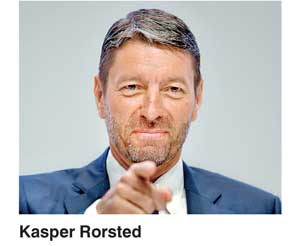Tuesday Feb 24, 2026
Tuesday Feb 24, 2026
Friday, 30 September 2016 00:01 - - {{hitsCtrl.values.hits}}
 Reuters: Closing the gap on clear market leader Nike is the challenge facing new Adidas boss Kasper Rorsted when the Dane takes charge of the world’s second biggest sportswear brand from the start of October.
Reuters: Closing the gap on clear market leader Nike is the challenge facing new Adidas boss Kasper Rorsted when the Dane takes charge of the world’s second biggest sportswear brand from the start of October.
Investors are banking on Rorsted, 54, repeating improvements to profitability he achieved at consumer goods maker Henkel and the Adidas share price has risen by around two thirds since his appointment was announced in January.
Ingo Speich, a fund manager at Adidas shareholder Union Investment, said he hopes Rorsted will scrutinise the Adidas product portfolio and its sales structure as the first steps to boosting lagging margins. “I expect small measures rather than a bombshell. But in 12-18 months, if the margin is still where it is now it will be difficult for the shares,” said Speich, a critic of outgoing Adidas Chief Executive Herbert Hainer.
Rorsted’s performance at Henkel, the maker of Schwarzkopf shampoo and Loctite glue, is being examined for clues as to what he will do at the sportswear group which supplies soccer jerseys to Manchester United and world champions Germany.
At Henkel, Rorsted culled 80% of the firm’s brands, pushing top names such as Persil at the expense of local labels. He also kept a tight control on costs, shifting some head office functions to “shared service” centres in lower-wage countries.
Adidas had 2,722 stores at the end of last year and plans to add another 500-600 by 2020 and quadruple ecommerce sales to two billion euros ($2.2 billion) by then. Nike is more ambitious – targeting$12.5 billion from ecommerce by then.
Rorsted, who formally takes charge on Oct. 1 after shadowing Hainer since August, was chosen after new investors including Egyptian tycoon Nasser Sawiris, Southeastern Asset Management founder Mason Hawkins and Belgian billionaire Albert Frere bought stakes in the company last year.
Sawiris and a representative of Frere have since taken seats on the Adidas board. Sawiris and Hawkins have also set up Southeastern Concentrated Value (SCV), a vehicle to spur boardroom change and influence strategy at firms they invest in.
Investors expect Rorsted to draw on his Henkel experience to make sourcing, logistics and advertising more efficient, although the spiralling cost of top sports sponsorships means it will be hard to bring down marketing spending. One way to boost efficiency would be to further simplify the product range. Adidas already plans to cut the number of different models by a quarter by 2020 to focus on top sellers like retro Superstars and UltraBoost running shoes.
Some investors want Rorsted, who played handball on the Danish youth team and is a keen skiier and mountain biker, to consider selling Reebok.